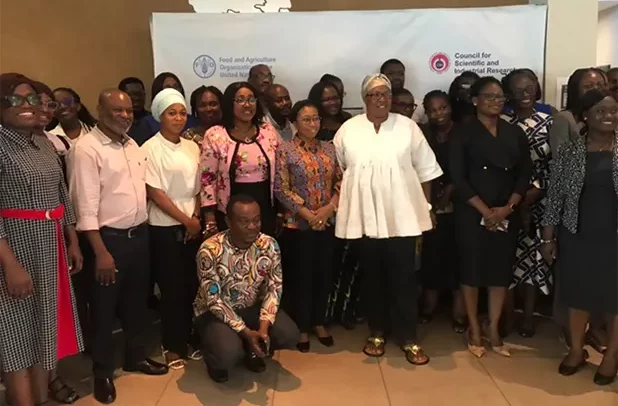Dignitaries in a group photograph
Nutrition experts have called for the inclusion of aquatic foods, particularly fish, in the School Feeding Programme to improve the nutritional quality of meals served to children.
Speaking at the launch of the Aquatic Foods in School Meal Project, Dr. Jolene Nyarko, a nutrition specialist and team member at the Council for Scientific and Industrial Research–Food Research Institute (CSIR-FRI), stressed that introducing fish into school menus would not only enhance children’s health but also support the livelihoods of those in the fish value chain.
“Fish is a rich source of protein, calcium, iron, zinc, iodine, and vitamins such as D and B12, which are essential for growth, immune function, and overall health,” she said.
“Given the evidence of stunting, thinness, and malnutrition among school-age children, it has become urgent to diversify school meals with aquatic foods,” she added.
Dr. Nyarko noted that the School Feeding Programme, established 20 years ago and now reaching over 4 million children across 12,000 schools, had made progress in increasing access to meals but often fell short on dietary diversity.
According to the nutritionist, a recent CSIR study in the Volta Region among 650 children found that 50 percent were stunted, 19 percent were underweight, and 7 percent overweight, pointing out that this underscores the scale of nutritional challenges.
The project, funded by the Food and Agriculture Organisation (FAO) of the United Nations and implemented in partnership with CSIR, the Fisheries Commission, Ghana Education Service, and the Ghana School Feeding Programme, will initially be piloted in Ekumfi in the Central Region and Kpone in Greater Accra.
Both districts are known for fishing and farming activities, making them ideal test sites.
Deputy Director of CSIR-FRI, Dr. Gregory A. Komlaga, underlined the importance of incorporating fish into school diets.
“At this crucial stage of their development, children need adequate nutrition to reach their full potential. Including fish in the School Feeding Programme will make a significant difference,” he said.
He added that the Food Research Institute’s mandate was to provide evidence-based advice to government on food policy, and that the integration of fish products into school meals represented a practical step towards tackling malnutrition.
The workshop that launched the initiative brought together key stakeholders including the Ghana Education Service, Ministry of Fisheries, fishmongers’ associations, and international partners.
The project aims to establish a sustainable framework for diversifying school menus, boosting child nutrition, and creating market opportunities for fish processors and traders.
By Prince Fiifi Yorke


